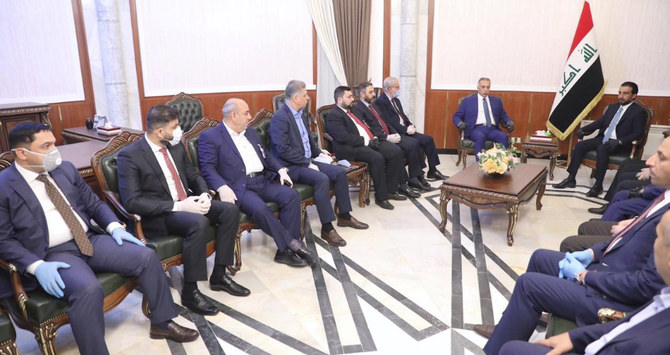BAGHDAD: Iraq’s former spy chief was sworn in as prime minister by lawmakers early Thursday after weeks of tense political negotiations as the country faces a severe economic crisis spurred by plummeting oil prices and the coronavirus pandemic.
The majority of 255 legislators attending the session approved the government plan and the majority of Cabinet ministers proposed by Mustafa Al-Kadhimi, officially inaugurating him as Iraq’s sixth premier since 2003 and ending five months of a leadership void.
Legislators accepted 15 ministers and rejected five, among them the ministries of trade, justice, culture, agriculture and migration. The ministries of oil and foreign affairs also remain vacant pending further political negotiations. According to Iraq’s constitution, a government can pass if over half of a proposed Cabinet is approved.
Al-Kadhimi, who gave up the intelligence post when he became the prime minister-designate, assumes the premiership as Iraq faces unprecedented crises amid falling oil revenues that will likely prompt unpopular austerity measures, a rising daily tally of coronavirus cases, and expected US-Iraq talks.
“This government came as a response to the social, economic and political crises our country is facing,” Al-Kadhimi said during the session, addressing lawmakers. “It is a government that will provide solutions, not add to the crises.”
The road to the premiership has been long and unwieldy for Al-Kadhimi. He was the third candidate chosen by Iraq’s fragmented political blocs after the previous two failed to get broad support. His success is a testament to lessons learned from where others had failed.
Former Communications Minister Mohammed Allawi resigned, citing obstruction from political parties in his attempt to pick an independent Cabinet. Former Najaf Gov. Adnan Al-Zurfi resigned amid political infighting.
Saudi Arabia’s King Salman and Crown Prince Mohammed bin Salman congratulated Al-Kadhimi on forming a government on Thursday.
Al-Kadhimi’s swearing-in also signifies how crucial the sectarian quota-based political system — called the Muhasassa in Arabic — remains in Iraqi politics. The dismantling of this system was a key demand of mass anti-government protests that broke out in October. Demonstrations died down as measures to contain the coronavirus took hold in the capital early this year.
Al-Kadhimi had to change his list of proposed ministers at least three times in the past week to appease Iraq’s fragmented political blocs. Deals were still being struck over the naming of ministers between political parties minutes before the bell rang to signal the start of the parliament session.
Officials close to Al-Kadhimi said he has strategized to leave ministerial appointments up to political blocs but plans to consolidate his leadership within the prime minister’s office to carry out reforms, similar to former Prime Minister Haidar Al-Abadi.
“If everyone cares about ministries, (Al-Kadhimi) is trying to take back the PMO and run reforms centrally,” said Renad Mansour, senior research fellow at Chatham House.
His government plans to address Iraq’s economic and health crises and pave the way for early elections in line with protest demands.
To do this, he said, the sovereignty of the state must be asserted. “This can be achieved by limiting the use of arms to the state, the armed forces and the commander in chief and not allowing Iraqi territories to be used for settling scores or launching attacks,” he said.
His first weeks in office are likely to be monopolized by the severe economic crisis in the wake of falling oil prices. Prices have hovered between $20-30 per barrel, about half of what was projected to finance the 2020 budget and barely enough for the crude-dependent country to pay public sector wages. Oil sales make up nearly 90% of state revenues.
In April the country made just $1.43 billion in oil sales, and is expected to be further constrained as OPEC production cuts take hold. The World Bank has predicted without adequate reforms, Iraq’s economy will contract by just under 10% this year.
The vacuum in leadership has left the country without an approved budget law, which in turn has limited its ability to borrow from foreign agencies. Al-Kadhimi’s first order of business will likely be passing a budget.
Officials in Abdul-Mahdi’s caretaker government had mulled over an array of cuts to scale down social benefits to public sector employees. But it remains to be seen if Al-Kadhimi will adopt these proposals, which would cut urgent spending by 30%.
Al-Kadhimi will also lead Iraq as negotiations are set to take place with the US in June. Relations suffered after a Washington-directed strike killed top Iranian general Qassim Soleimani in January. The talks will cover, among other things, the presence of the US-led coalition.
The issuance of the latest US sanctions waiver for 30 days enabling Iraq to continue purchasing vital Iranian gas to meet energy needs was also linked to a new government being formed. The current waiver runs out May 26.
According to a statement from the State Department late last month, Secretary of State Mike Pompeo “granted this brief extension of the waiver to allow time for the formation of a credible government.”



























